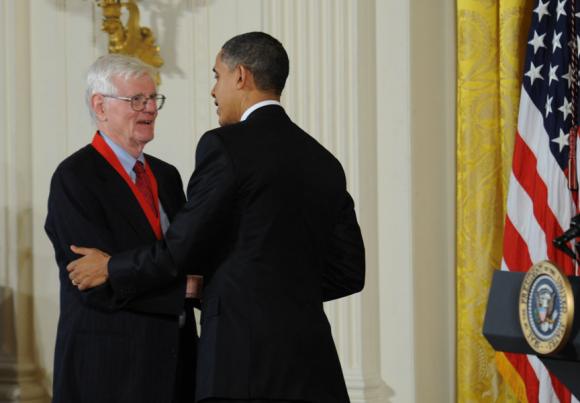PROVIDENCE, R.I. [Brown University] — Renowned author and historian Gordon Wood, professor emeritus of history at Brown, has received the 2010 National Humanities Medal. The medals, honoring achievements in history, literature, education, and cultural policy, were presented by President Barack Obama during a White House ceremony on Wednesday, March 2, 2011.
The National Humanities Medal honors individuals or groups whose work has deepened the nation’s understanding of the humanities, broadened citizens’ engagement with the humanities, or helped preserve and expand Americans’ access to important resources in the humanities. Wood’s citation was “for scholarship that provides insight into the founding of the nation and the drafting of the U.S. Constitution.”
“As a brilliant scholar and gifted teacher, Gordon Wood has made unique contributions to scholarship, enriching our understanding of American history,” said Brown University President Ruth J. Simmons. “This well deserved tribute acknowledges the importance of his contributions to the nation.”
In addition to Wood, this year’s honorees included authors Philip Roth and Joyce Carol Oates. Previous winners include Nobel Prize winner Toni Morrison, novelist John Updike, Nobel Peace Prize laureate Elie Wiesel, sociologist Robert Coles, and filmmaker Steven Spielberg.
Gordon S. Wood
A preeminent scholar of the Revolution and the early Republic, Gordon S. Wood is the Alva O. Way University Professor and professor of history emeritus at Brown. He received his Bachelor of Arts from Tufts and his Ph.D. from Harvard. He taught at Harvard and the University of Michigan before joining the faculty at Brown in 1969.
Wood’s 1992 book, The Radicalism of the American Revolution, won the Pulitzer Prize for history and the Ralph Waldo Emerson Prize. He is the author of The Creation of the American Republic, 1776-1787 (1969), which won the Bancroft Prize in history and the John H. Dunning Prize in 1970; The Americanization of Benjamin Franklin (2004), which won the Julia Ward Howe Prize from the Boston Authors Club in 2005; and a number of other distinguished books on early American history. His volume in the Oxford History of the United States, Empire of Liberty: A History of the Early Republic, 1789-1815, published in October 2009, was a finalist for the 2010 Pulitzer Prize in history. The Pulitzer committee described it as “a lucid exploration of a turbulent era when a profoundly changing America, despite the sin of slavery, came to see itself as a beacon to the world.”
Wood is a fellow of the American Academy of Arts and Sciences and the American Philosophical Society. He is currently editing John Adams’ manuscript letters, to be published in an upcoming volume for the Library of America.
“After a half a century or more of studying history, I don't think there are any easy lessons that you come away with,” Wood has said of his field. “I think it teaches one big lesson, which I would equate with wisdom — that things don’t quite work out the way one intends, and that you have to be willing to accept the limitations of life.”
Of his honor, he says he hopes it draws attention to the field of history, which he calls the “ultimate humanistic discipline.” “We don’t teach history because we want to have history teachers or history professors,” he said. “We’re teaching history because it enriches lives.”

